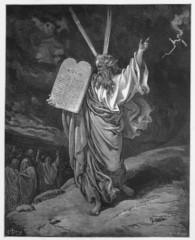
God makes himself known in many ways. To Samuel it was a voice in the night (1 Sam. 3:1-15), to St Paul it was a brilliant light which caused him to fall to the ground (Acts 9:3-7) and to Moses it was through a bush that burned but was not consumed (Exodus 3:2-6). Moses was the great lawgiver who spoke intimately with God: “Thus the Lord used to speak to Moses face to face, as one speaks to a friend” (Exodus 33:11).
In today’s reading, Moses promises a prophet like himself, who will teach with the authority of God. People were impressed by Jesus. He did not have an official status like the scribes and the pharisees. These people had great learning but somehow they failed to nourish their people. We know from the many accounts given by the evangelists that often they were more concerned with their standing in society than with preaching God’s message. Jesus was different. He spent whole nights in prayer. He conveyed to his audience his intimate relationship with his Father as Moses had done with Yahweh long ago.
There are numerous voices today, which speak with seeming authority but in the long term do not provide food for the soul. St Josephine Bakhita was kidnapped by Arabic traders and sold into slavery when she was only eight. She suffered the cruellest treatment from her owners, but came eventually into the possession of a family who took her to Italy with them. For a time she was left in the care of the Canossian sisters in Venice where she found God and Christianity. She expressed feelings of gratitude to those who had kidnapped her, since without this she would not have met the nuns, whose example led her to Christ.
Jesus showed that he had power over the most destructive forces. This is reassuring in our own day when we are surrounded by such forces.